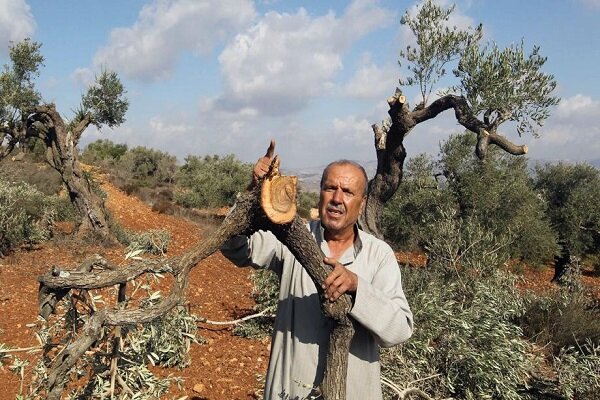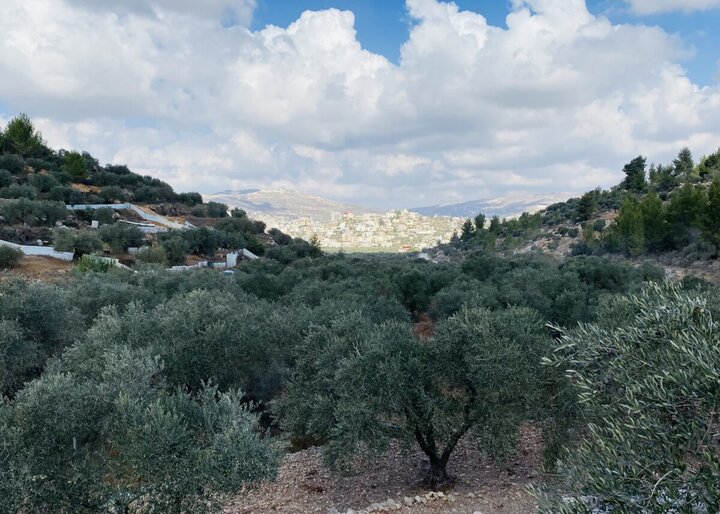Olive Product Boycott in Palestine: The 77-Year Strategy of the Zionist Regime

Mehr News Agency, International Desk: Targeting olive trees in Palestine by the Israeli regime during the 76 years of occupation has evolved into a purposeful and systematic strategy. Attacks by occupiers on olive crops, wich have long been a vital source of livelihood for Palestinian families and continue today, considerably impact agriculture, the economy, and Palestinian identity. Each year, during the harvest season, deliberate assaults by the Israeli military on Palestinian olive trees-Palestine’s symbolic tree-intensify.
Olives represent the largest agricultural product for Palestinians,covering 45 percent of all cultivated land. Palestinian citizens are often barred from harvesting olives from their own lands during harvest season; Area C in the West Bank-which accounts for 60 percent of cultivated Palestinian land-is heavily restricted by Israel through stringent controls and obstacles.
The resilience of Palestinians to remain on their land is deeply tied to the survival of these olive trees.Occupiers and settlers hold that uprooting olive trees marks the start of displacing Palestinians from their homeland. Accordingly, Israeli forces suppressed olive harvest activities this year-as in previous years-in villages such as Al-Nazla al-Sharqiya north of Tulkarm in northern West Bank; Turmus Ayya north of ramallah; and Mukhmas north of occupied Jerusalem.
During one such raid, several participants suffered breathing difficulties due to tear gas inhalation. Eyewitnesses reported that Israeli forces used tear gas canisters and stun grenades to prevent Palestinian farmers from working their fields. Additionally, Isam Jihad Nasser-a teenage boy from Beita settlement-sustained critical injuries during an Israeli military assault while picking olives; he remains in a coma.
The Israeli regime enforces its boycott on palestinian olives through three main measures detailed below.
How is Olive Boycott enforced in Palestine?
The first measure centers around occupation laws restricting access: many fertilizers are banned from entering or circulating within markets; roads and checkpoints are frequently closed or blocked; over 900 military checkpoints operate throughout the West Bank alone. export bans also restrict shipments abroad. The journey between Ramallah and Nablus covers only 50 kilometers but sometimes takes up to six hours due to restrictions preventing farmers’ access to their lands.
The second method involves direct attacks-the army’s and settlers’ assaults on olive trees themselves-as well as attacks against farmers working their fields including thefts after harvests along with stolen livestock and equipment.The Israeli army employs bulldozers to uproot trees or poisons them directly; methods also include flooding orchards with sewage waste.
The third major factor is imposed by Israel’s apartheid wall constructed after the Second Intifada spanning approximately 670 kilometers across occupied territories. access across this barrier requires special permits issued only twice yearly for short periods no longer than two days at a time-for plowing or harvesting purposes alone. Since hostilities escalated following October 2023’s Gaza invasion phase began, no farmer has been able to reach his orchards leaving fruits rotting on branches untouched for months at end into early 2024 when some delayed permits were granted too late amid pervasive neglect aggravated further as weeds destroyed many groves’ health over consecutive years without care.
Palestinians Stand Firm Like Olive Trees
Like ancient olive groves rooted firmly for centuries within their native soil-Palestinians proudly persevere despite hardship within their homeland.u00a0Farmers,u00a0laborers,u00a0and businesses dedicatedu00a0to nurturing olives eagerly anticipate every harvest season-even though each yearu00a0their lands face increased targeting.u00a0Over decades under occupation coupled with concerted boycotts against u200bthis cornerstone crop,u00a0families increasingly lost reliance upon harvesting both culturally significant produce while utilizing proceeds towards social occasions like weddings or home construction due mainly fragmented ownership patterns.u00a0The relentless assaults inflicted upon these iconic groves stand among some most heinous crimes committed throughout occupation history marking persistent erasure attempts never forgotten nor accepted historically.n
n
A look back reveals that Palestine is indeed.home.to-the-origin-of-olive-trees.This tree transcends botany there-it embodies heritage,a symbol.of-territory,and emblematic-of-survival.Many date back hundreds .even thousands .of.years.serving witnesses.to.succession-of.civilizations.and.unyielding_resistance.Every_olive_tree_exemplifies_history,resilience,_and_rights._That_is_whyy_the_occupying_forces-target_it_with_savage_force.”



